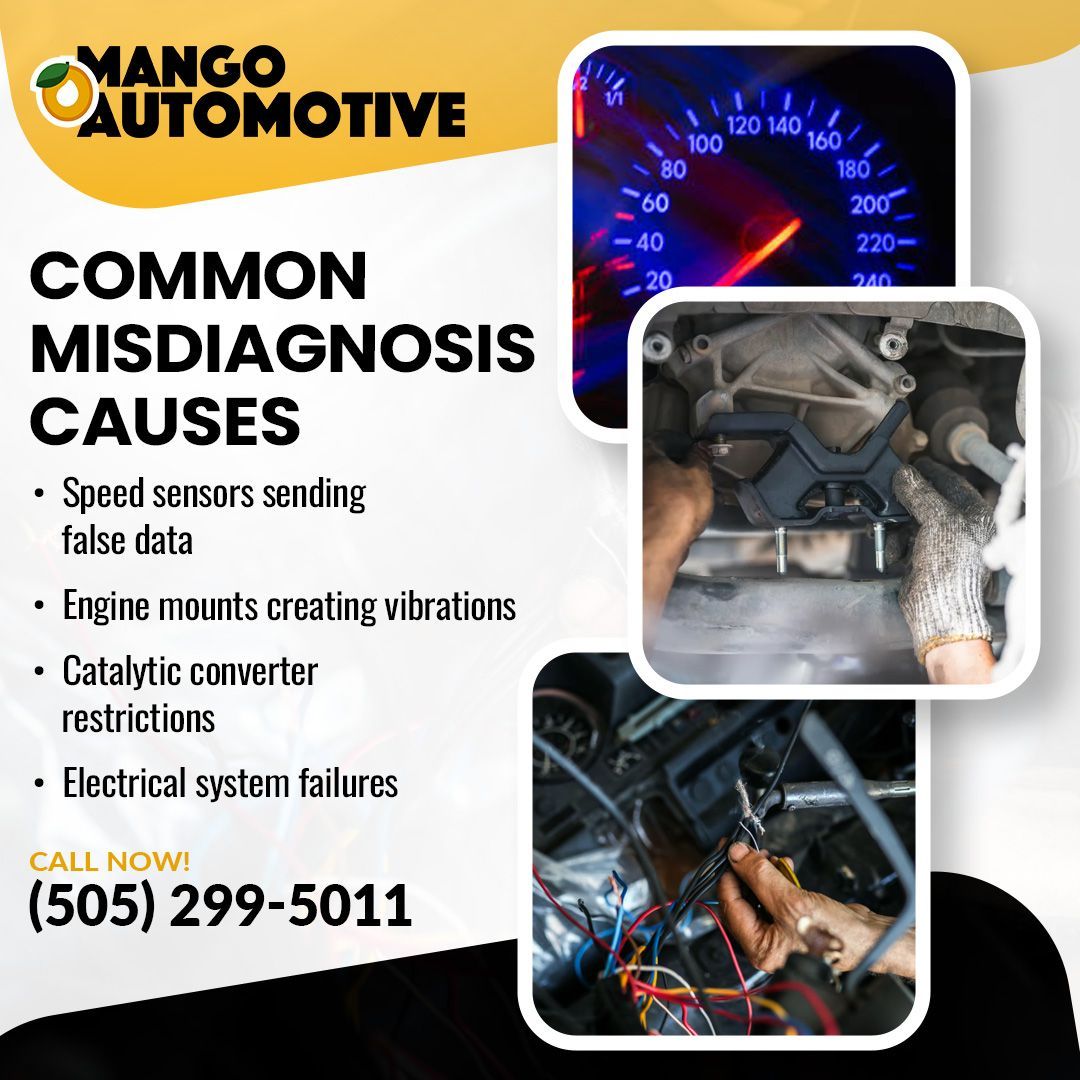Auto Repair in Las Cruces: Understanding Exhaust System Components and Repairs
Your car's exhaust system is more than just the muffler. It's a network of parts that work together to keep your engine running smoothly. When something goes wrong, you'll notice loud noises, poor performance, or even smell exhaust fumes inside your car.
Knowing what each part does and recognizing warning signs helps you get problems fixed before they get expensive. At
Mango Automotive & Diesel, we provide
auto repair in Las Cruces and have helped countless drivers get back on the road safely. Our shop handles exhaust system repairs from simple muffler repairs to complete catalytic converter replacement, using quality parts and reliable workmanship. Getting help early saves you money and keeps your car running right.

How Your Exhaust System Works
The exhaust system starts at the engine and ends at the tailpipe. It moves hot gases from your engine through several parts before releasing them safely behind your car. Each part has a job - removing harmful gases, reducing noise, and keeping your engine working efficiently.
When one part breaks, it can affect others. A small leak might get bigger and damage nearby components. That's why it's smart to have problems checked at an auto repair shop as soon as you notice them. The system includes your exhaust manifold, catalytic converter, oxygen sensors, muffler, and connecting pipes. To help you understand how everything works together, here's the complete path your exhaust gases take from start to finish
Step Component Function
1 Engine - Hot exhaust gases created
2 Exhaust Manifold - Gases collected from cylinders
3 Oxygen Sensor - Computer monitors fuel mixture
4 Catalytic Converter - Harmful gases cleaned
5 Oxygen Sensor - System efficiency monitored
6 Resonator - Sound frequencies reduced
7 Muffler - Engine noise quieted
8 Tailpipe - Clean gases released safely
Now that you understand the basic flow, let's look at each component in detail and what happens when they need repair
Main Exhaust System Components
Exhaust Manifold
The exhaust manifold collects hot gases from your engine's cylinders and sends them into the rest of the exhaust system. It's usually made of cast iron or steel and bolts directly to your engine. This part gets extremely hot and deals with a lot of pressure every time you drive.
Manifolds are subjected to a lot of heat and stress, which causes them to develop cracks over time. Most problems happen where the manifold connects to the engine or where different sections meet.
Signs of Problems
If your exhaust manifold has problems, you'll usually hear it first. A ticking or tapping sound when you start your car is the most common sign. The sound might get quieter as your engine warms up, but it will keep coming back.
You might also see exhaust smoke near your engine or smell exhaust fumes. Sometimes you'll notice your car doesn't have as much power as usual. These problems won't go away on their own and can get worse if you wait.
Catalytic Converter
Your catalytic converter cleans up the exhaust gases before they leave your car. It contains special metals that change harmful gases into less dangerous ones. This part is required by law on most cars to reduce air pollution.
The converter looks like a metal canister in your exhaust system, usually located between your engine and muffler. Inside are materials like platinum and rhodium that help clean the exhaust. These metals are expensive, which is why catalytic converters cost so much to replace.
Common Problems
When catalytic converters fail, you'll notice your car runs poorly. It might feel sluggish when you accelerate or use more gas than normal. You might also smell rotten eggs from your exhaust or see dark smoke coming from your tailpipe.
Catalytic converter replacement can cost $1,000 to $3,000, making it one of the more expensive exhaust repairs. However, you can't legally drive without one, and a bad converter will cause you to fail emissions testing. An
auto repair shop can test your converter to see if it really needs replacing or if another problem is causing the symptoms.
Oxygen Sensors
Oxygen sensors measure how much oxygen is in your exhaust gases. Your car's computer uses this information to adjust how much fuel goes into your engine. Most cars have at least two sensors - one before the catalytic converter and one after.
These sensors help your engine run efficiently and keep emissions low. They play an important role in your car's performance and fuel economy. When they start to fail, your engine can't adjust the fuel mixture properly.
Signs They Need Replacement
Faulty oxygen sensors usually cause your check engine light to come on. You might also notice your car getting worse gas mileage or running rough. The car might hesitate when you try to accelerate or idle roughly at stop lights.
Most manufacturers recommend replacing oxygen sensors every 60,000 to 100,000 miles. It's much cheaper to replace them before they fail completely than to deal with the engine problems and poor fuel economy they can cause.
Muffler
The primary function of a muffler is to reduce engine noise. Without it, your car would be extremely loud. The muffler uses special chambers and materials to absorb and cancel out engine noise. Mufflers also help maintain proper exhaust flow. A good muffler reduces noise without blocking the exhaust gases too much. This balance keeps your engine running efficiently while keeping noise at reasonable levels.
When Mufflers Need Repair
The most obvious sign of muffler problems is noise. If your car suddenly gets much louder, especially when you start it or accelerate, the muffler probably has a problem. You might hear rumbling, roaring, or rattling sounds. Sometimes a simple weld can fix a small hole. In other cases, the whole muffler may need replacement. Auto repair technicians can check your muffler and recommend the fix.
Resonator
The resonator works with the muffler to fine-tune the exhaust noise. It targets specific sound frequencies that your muffler might miss. Not all cars have resonators, but if yours does, it helps create a quieter, more pleasant exhaust sound.
When resonators develop holes or damage, you might notice your exhaust sounds different - maybe louder or with a different tone. Like mufflers, resonators can often be repaired by welding in a pipe section rather than replacing the whole part.
Exhaust Pipes
The pipes in your exhaust system connect all the parts together and carry exhaust gases from your engine to your tailpipe. These pipes are constantly exposed to weather, road salt, and road debris, making them prone to rust and damage.
Pipe problems usually show up as leaks, which create noise and can let dangerous fumes into your car. Small holes can often be repaired temporarily, but badly rusted pipes need replacement. Since pipes are typically less expensive than other exhaust parts, replacement is often the better long-term choice.
Warning Signs You Need Exhaust Repair
Noise Changes
As we have discussed earlier, sudden changes in exhaust noise are the clearest sign that something's wrong. Remember those ticking sounds from manifold problems or loud rumbling from muffler damage? Any change in your car's sound means it's time for a checkup.
Performance Problems
We mentioned how exhaust issues affect performance when discussing oxygen sensors and catalytic converters. If you're experiencing hesitation, rough idling, or poor gas mileage, these symptoms often point to specific exhaust system problems.
Smells and Fumes
Strong exhaust smells inside your car require immediate attention from an auto repair technician. This could mean dangerous carbon monoxide is entering your vehicle. You might also notice a rotten egg smell from catalytic converter problems.
Visual Signs
Look at your tailpipe occasionally for excessive rust, soot buildup, or visible holes. You might also see unusual exhaust smoke. Black smoke often means fuel mixture problems, while blue smoke suggests oil burning issues. Check under your car for hanging parts or obvious damage.
Repair vs Replacement Decisions
When Simple Repairs Work
Many exhaust problems can be fixed with simple repairs. Small holes in pipes can be welded, loose clamps can be tightened, and damaged gaskets can be replaced. These repairs are typically much cheaper than replacing entire components. If most of your exhaust system is in good shape, targeted repairs can get you back on the road affordably.
When Replacement Makes Sense
Sometimes replacement is the better choice, even if repair is possible. If multiple parts are failing or if rust has weakened large sections of your exhaust system, replacement often costs less in the long run. Extensive rust usually means other parts will fail soon. Rather than making repeated trips to an auto repair shop for multiple small repairs, replacing larger sections saves time and money.
Getting Professional Advice
A good auto repair shop near you can help you decide between repair and replacement. They'll consider your car's age, the extent of damage, and your budget to recommend the best approach. Sometimes a temporary repair can get you through until you're ready for a bigger investment. At Mango Automotive & Diesel, we explain your options clearly and help you make the choice that makes the most sense for your situation.
Why Choose Professional Exhaust Repair
Safety First
Exhaust repairs involve safety concerns that make professional service important. Improper repairs can create dangerous carbon monoxide leaks or cause parts to fall off while driving. Professional auto repair technicians know how to make repairs safely and reliably. Exhaust work also requires special tools and equipment that most people don't have at home. Professional shops have the lifts, tools, and experience needed to do the job right the first time.
Proper Diagnosis
Exhaust problems sometimes have multiple causes or affect other vehicle systems. Professional technicians can diagnose the root cause of problems, not just treat symptoms. This prevents repeated repairs and saves money in the long run. Modern cars also have computer systems that monitor exhaust performance. Professional diagnostic equipment can read these systems and identify problems that might not be obvious from symptoms alone.
Quality Parts and Work
Quality parts that professional shops use fit better and last longer than generic alternatives. Professional installation also includes proper torque specifications, gaskets, and support systems. Most shops also provide warranties on their work, giving you peace of mind that the repair is done right. If something goes wrong, you have recourse to get it fixed.
Mango Automotive & Diesel: Your Las Cruces Exhaust Specialists
Complete Exhaust Repair
At Mango Automotive & Diesel, we handle all types of exhaust system problems. Whether you need a simple muffler repair or a complete system replacement, our experienced technicians have the skills and equipment to do the job right.
Our technicians start with a thorough diagnosis to identify exactly what's wrong and what caused the problem. Then we explain your options clearly and help you choose the repair approach that fits your needs and budget.
Our auto repair shop uses quality parts and professional installation techniques. We make sure repairs are done safely and will last. Whether it's a quick weld or major component replacement, we treat every job with the same attention to detail.
Honest Service
We've built our reputation on honest, reliable service. We explain problems clearly and recommend only the repairs you actually need. Our goal is to get your car running safely and reliably without breaking your budget. We provide written estimates before starting work so you know exactly what to expect.
Local Expertise
As the local experts for auto repair in Las Cruces, we understand the driving conditions and environmental factors that affect exhaust systems in our area. We know which repairs hold up best and which parts provide the best value for local drivers. We also understand that car problems can disrupt your daily routine. That's why we work efficiently to minimize your downtime while making sure repairs are done thoroughly and safely.

Keep Your Exhaust System Healthy
Understanding your exhaust system helps you recognize problems early and avoid expensive emergency repairs. Pay attention to changes in noise, performance, or smells that might indicate exhaust problems. Regular maintenance and quick attention to small problems prevent bigger issues later. Professional diagnosis and quality repairs provide the best value and keep you safe on the road.
Don't ignore exhaust problems, especially if you smell exhaust fumes inside your car or notice major changes in performance. These can be safety issues that need immediate attention. Contact Mango Automotive & Diesel today at
(575) 221-9941 to schedule your appointment for exhaust repairs. Our experienced technicians provide reliable diagnosis and auto repair in Las Cruces using quality parts and professional techniques.












